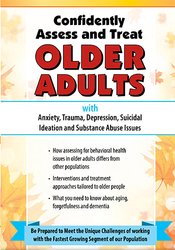

Older adults are the fastest growing segment of our population. Late-life is a complicated time full of adjustment and transition. Older adults struggling to ride a wave of change are increasingly likely to show up in offices like yours with anxiety, trauma, depression, substance abuse and other mental health issues.
But you worry that assessing and treating people over age 65 is just for specialists. That without lengthy and expensive training you’ll be unable to successfully meet the unique challenges of working with this population.
This recording will transform your practice with older adults from one of hesitance and self-doubt to one of prepared confidence. Get the skills and tools you need to effectively assess and treat older clients for anxiety, trauma, depression, suicidal ideation, and substance use issues. From differentiating the signs of dementia from depression to overcoming generational sigma and shame surrounding mental health conditions, you’ll walk away with a roadmap for combining proven interventions from CBT, Mindfulness, and Behavioral Activation with practical considerations for effectively working with older adults.
Can you afford to be unprepared to serve this rapidly growing population?
Purchase today and ensure that you’re poised and ready to provide the best care possible when older clients walk through your door!
This online program is worth 6.0 hours CPD.
| File type | File name | Number of pages | |
|---|---|---|---|
| Manual - Confidently Assess and Treat Older Adults (7.54 MB) | 100 Pages | Available after Purchase | |
| Manual - Confidently Assess and Treat Older Adults - French (7.54 MB) | 100 Pages | Available after Purchase | |
| Manual - Confidently Assess and Treat Older Adults - Italian (7.54 MB) | 100 Pages | Available after Purchase |
Natali Edmonds, PsyD, ABPP, is Board Certified in Geropsychology by the American Board of Professional Psychology. Dr. Edmonds is a geropsychologist for the Home-based primary care program with the Veterans Affairs Phoenix Health Care System where she provides psychotherapy to medically compromised older adults in the home and via telehealth modalities. Dr. Edmonds conducts in-home cognitive assessments for older veterans who are demonstrating declines in cognitive functioning and also engages in caregiver stress interventions as appropriate. An active member of interdisciplinary treatment team, she provides psychology relevant staff trainings. Dr. Edmonds also provides education and support through Dementia Careblazers, an online resource for dementia that gives them the knowledge, skills, and information they need to take the best care of themselves and their loved ones with dementia. Dr. Edmonds earned her Psy.D. from the Arizona School of Professional Psychology of Argosy University.
Speaker Disclosures:
Financial: Natali Edmonds has an employment relationship with the Veterans Affairs Phoenix Health Care System; and Dementia Careblazers. She receives a speaking honorarium from PESI, Inc. She has no relevant financial relationships with ineligible organizations.
Non-financial: Natali Edmonds has no relevant non-financial relationship to disclose.
Satisfaction Guarantee
Your satisfaction is our goal and our guarantee. Concerns should be addressed to info@pesi.co.uk or call 01235847393.
Please wait ...